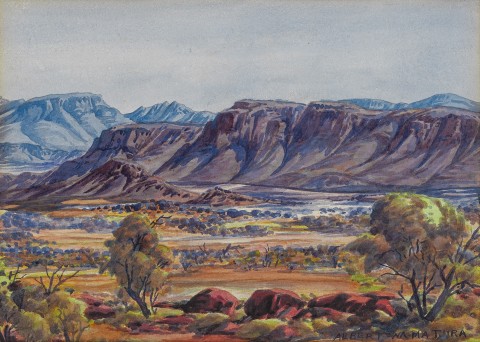RANGES NEAR JAY CREEK, c.1950s
ALBERT NAMATJIRA
watercolour on paper
26.0 x 35.0 cm
signed lower right: ALBERT NAMATJIRA
signed and inscribed with title verso: Ranges Near Jay Creek / Albert Namatjira
bears inscription on backing verso: Ranges Near Jay Creek
bears inscription on partial gallery label verso: ALBERT NAMATJIRA / THE PLAINS NEAR JAY CREEK / 769 / 3
Spinifex Gallery, Alice Springs, Northern Territory
Private collection, New South Wales, acquired from the above c.2000
‘…Many years ago, an Aboriginal man from central Australia, Albert Namatjira, became very famous as a painter. Using Western watercolour techniques he painted many landscapes. But what non-aboriginal people didn’t understand, or chose not to understand, was that he was painting his country, the land of the Arrernte people. He was demonstrating to the rest of the world the living title held by his people to the lands they had been on for thousands of years.’1
Although today synonymous with our vision of the Australian outback, Namatjira’s art nevertheless experienced many vicissitudes over the course of the last century. If his first solo exhibition in 1938 at the Fine Arts Society in Melbourne was a sell-out success, with popularity and fame continuing throughout his lifetime, praise for Namatjira’s skilful adaptation of a Western medium was, nevertheless, inevitably accompanied by a bitter twist; his paintings ‘…were appreciated because of their aesthetic appeal, but they were at the same time a curiosity and sign that Aborigines could be civilised.’2 Ironically such perceived ‘assimilation’ would later bring his art into disrepute, with Namatjira virtually ignored by the Australian art establishment during the 1960s and 70s. Fortunately, the Papunya Tula Aboriginal art ‘renaissance’ and cultural politics of reconciliation during the 80s prompted long overdue reassessment of Namatjira’s unique contribution, and more recently, he has received the recognition he so deserves with three biographies published, and three major exhibitions mounted by public galleries, including a retrospective at the National Gallery of Australia in 2002 to celebrate the centenary of his birth, Seeing the Centre: The Art of Albert Namatjira 1902 – 1959.
With its striking aesthetic appeal and embedded, multi-layered possibilities of meaning, Ranges near Jay Creek, c.1950s, offers a superb example of Namatjira’s achievements, encapsulating the highly unique vision that has subsequently inspired generations of Indigenous and non-Indigenous artists alike across Australia. As Belinda Croft elucidates, however, ‘Albert’s Gift’ was more far-reaching than simply the tangible legacy of his art, ‘…more than the sum parts of watercolour paints on paper. It is an essence that resides in the strength of Namatjira’s work – his courage, his sorrow, his spirituality – in these days of ‘reconciliation’, but most of all, in the spiritual heritage of every indigenous person in Australia.’3
1. Galarrwuy Yunupingu cited in ‘The black/white conflict’ in Caruana, W. (ed.), Windows on the Dreaming, Australian National Gallery, Canberra, Ellsyd Press, Sydney, 1989, p. 14
2. Morphy, H., Aboriginal Art, Phaidon Press, London, 1998, p. 270
3. Croft, B., ‘Albert’s Gift’ in French, A., Seeing the Centre: The Art of Albert Namatjira, 1902 – 1959, National Gallery of Australia, Canberra, 2002, p. 148
VERONICA ANGELATOS
